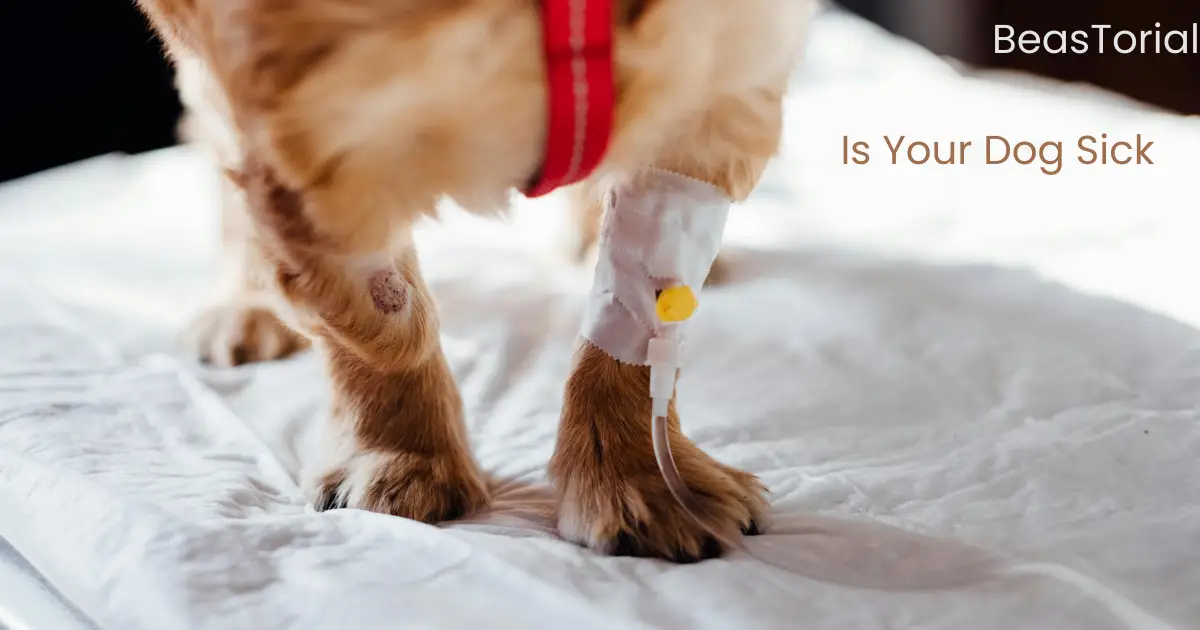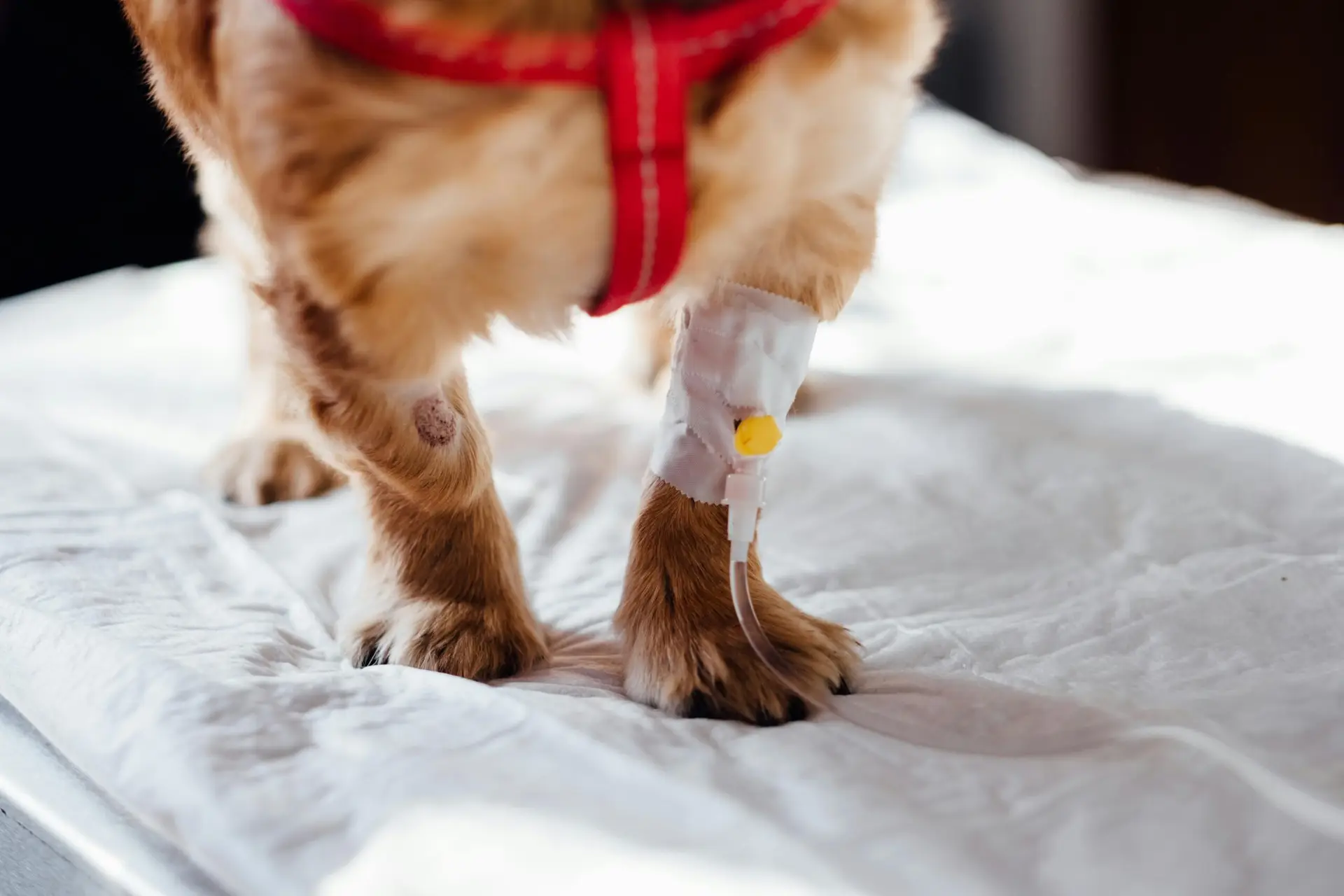Contents
- 1 Is Your Dog Sick? 10 Signs to Look For
- 1.1 Introduction
- 1.2 Understanding Normal vs. Abnormal Dog Behavior
- 1.3 Physical Symptoms to Watch For
- 1.4 Behavioral Changes That Signal Illness
- 1.5 Common Illnesses and Their Specific Symptoms
- 1.6 Age-Related Health Considerations
- 1.7 When to Seek Immediate Veterinary Care
- 1.8 Preventive Care and Health Monitoring
- 1.9 Supporting Your Sick Dog’s Recovery
- 1.10 Frequently Asked Questions
- 1.10.0.1 How can I tell if my dog is in pain?
- 1.10.0.2 What should I do if my dog won’t eat?
- 1.10.0.3 When is vomiting considered serious?
- 1.10.0.4 How do I know if my dog’s breathing is abnormal?
- 1.10.0.5 What are signs of dehydration in dogs?
- 1.10.0.6 Should I be concerned about changes in my dog’s bathroom habits?
- 1.11 Conclusion
- 1.12 Resources and Further Reading
Is Your Dog Sick? 10 Signs to Look For
Introduction
You know that heart-stopping moment when you glance at your furry best friend and think, “Something’s just not right”? As a dog parent, you’ve probably asked yourself the question is your dog sick more than once. That simple thought can send a wave of worry rushing in, because our dogs are more than pets they’re family.I’ve spent countless late nights quietly watching my dogs breathe, wondering if that tiny change in rhythm meant something serious. The truth is, figuring out is your dog sick isn’t just about avoiding emergencies it’s one of the most loving and responsible things you can do for your pup.Dogs can’t tell us with words when something is wrong, but they do tell us with their behavior, body language, and subtle changes in habits. Recognizing these signs early is the key to getting them the right care in time.This guide will help you spot the clues you might otherwise miss and confidently answer the question: is your dog sick? Because when it comes to their health, early action can mean the difference between a quick recovery and something more serious.So the next time that little voice in your head whispers is your dog sick, you’ll know exactly what to look for and when it’s time to call the vet.
Understanding Normal vs. Abnormal Dog Behavior
Getting to Know Your Dog’s Unique Personality
You ever notice how dogs are basically little furry weirdos, each with their own quirks? Seriously, they’re all over the place. Like, my Golden Retriever, Max dude wakes up every morning acting like he just hit the jackpot. He’s got that “LET’S GO!” energy before I’ve even had coffee. Meanwhile, my buddy’s bulldog, Charlie? That guy treats mornings like a personal insult. He stretches, yawns, gives you a look like, “Really? Breakfast already? Chill.”
Point is, you gotta know your own dog’s vibe. If you pay attention, you’ll spot when something’s off. Like, maybe your dog hoovers up their food in record time, or maybe they’re a slow-motion grazer. Maybe you get the full-on, Olympic-level zoomies when you walk in the door, or maybe it’s just a lazy tail wag from the same old dent in the couch. All those little habits? That’s your normal your “dog baseline,” if you will. Miss that, and you’ll miss when your dog’s feeling meh. Oh, and the health stuff: dogs run way hotter than we do. 101 to 102.5 degrees Fahrenheit that’s normal for them, even though it feels pretty toasty to us. Little dogs? Their hearts are basically beating out of their chests compared to the big guys think hummingbirds vs. eagles. And you can usually spot a healthy pup by their eyes bright, kinda sparkly, with that “what chaos can I cause today?” glint. Plus, their nose? Should be cool and a bit damp (especially when they’re shoving it into your business for the 100th time).
Red Flags That Made Me Worry
Let me share something that happened with my dog Luna last year. She’s usually the first one at her food bowl, practically doing a happy dance at dinner time. But one evening, she just… wasn’t interested. She sniffed her food and walked away. My gut immediately told me something was wrong, even though she seemed okay otherwise.
This is exactly what I mean by red flags. Dogs are masters at hiding pain (it’s an evolutionary thing), but they can’t hide changes in their daily routines. When your usually food-motivated pup suddenly becomes picky, when your couch potato starts pacing restlessly, or when your social butterfly wants to hide under the bed these are your dog’s way of waving a little flag saying, “Hey, I don’t feel so great.”
Watch for changes in their “voice” too. Is your quiet dog suddenly whimpering? Is your chatty pup unusually silent? Dogs communicate so much through their vocalizations, and changes often mean they’re trying to tell us something important.
Physical Symptoms to Watch For
Tummy Troubles Every Dog Parent’s Nightmare
Let’s talk about the dreaded stomach issues. If you’ve been a dog parent for more than five minutes, you’ve probably dealt with some form of digestive drama. I remember the first time one of my dogs had an upset stomach I panicked and called my vet at 11 PM (thank goodness for understanding veterinarians).Vomiting happens to dogs sometimes, just like it happens to us. Maybe they ate something questionable during their walk (why do they think random sidewalk snacks are delicacies?), or perhaps they wolfed down their dinner too fast. But when vomiting becomes frequent, or if you see blood, that’s when your parent alarm bells should be going off.
Diarrhea classic dog problem, right? Especially if you’ve got one of those pups who thinks sidewalk trash is Michelin-star cuisine. But hey, if you spot blood, black stuff, or weird slime in there, or it just keeps going for more than a day? Yeah, don’t mess around, call the vet ASAP.
You know what freaked me out once? My dog just sat there, staring at his food like it was about to bite him back. Wouldn’t touch a thing, just looked all sad and lost. Turns out, dude had some gnarly dental pain wanted to eat so bad but just couldn’t. Ugh, breaks your heart seeing that.
Breathing and Heart Health The Scary Stuff
This is where things can get really frightening as a dog parent. Normal dog breathing should be pretty effortless you might not even notice it most of the time. But when your dog starts panting heavily while just lying around, or if they seem to be working hard just to breathe, that’s when you need to pay serious attention.
I learned about gum color the hard way when my friend’s dog had an emergency. Did you know that healthy dog gums should be pink, just like ours? If you gently press on your dog’s gums and they don’t return to pink within a couple of seconds, or if they look pale, white, or blue, that’s a sign their circulation isn’t working properly.
Coughing is another one of those symptoms that can range from “probably nothing” to “we need help now.” My neighbor’s dog developed a persistent cough that sounded like he had something stuck in his throat. It turned out to be early heart disease, and catching it early made all the difference in his treatment.
Behavioral Changes That Signal Illness
When Your Energizer Bunny Becomes a Couch Potato
You know your dog better than anyone, so you’ll be the first to notice when their energy levels shift dramatically. My usually bouncy Labrador mix once spent an entire day just lying around, showing zero interest in his favorite squeaky ball. Man, he was acting so out of character, I just knew something was off even before any other signs popped up. You know how dogs get all fidgety sometimes? Like, they’ll flop down, then jump right back up, wander over to another spot, rinse and repeat. Kinda like us tossing and turning when our back’s killing us, except, well, at least we can whine about it. Dogs? Not so much.
Oh, and here’s a weird one: ever see your dog drop their front half down with their butt stuck up in the air? Looks like a deep stretch or maybe a yoga move, right? Turns out, that’s called the “prayer pose,” and it can mean their tummy’s hurting. Honestly, wish someone had clued me in on that way sooner in my dog-parent life. Would’ve saved me a few gray hairs, not gonna lie.
Social Butterflies Becoming Hermits
Dogs are so much like little furry roommates, right? When your hyper-social mutt suddenly nopes out of the family hangout and hides under the dining table, don’t just laugh it off. One of my friends totally shrugged off her dog’s new “hermit” routine until she realized he wasn’t just being dramatic; the dude was actually sick. Some pups go the opposite way, though. Your normally chill, “I’ll be in the other room” dog suddenly glued to your hip? Following you everywhere, looking at you like you’re their emotional support human? Yeah, that’s usually their way of saying, “Hey, something’s up, help me out here.” Dogs, man they’ve got their own ways of waving the red flag.
Common Illnesses and Their Specific Symptoms
| Condition | What You’ll Probably Notice First | Other Signs to Watch For | How Urgent Is This? |
| Upset Stomach | Won’t eat their favorite treats, vomiting, loose stools | Acting tired, drinking more or less water, seems uncomfortable | Usually can wait until morning, but call if it gets worse |
| Respiratory Infection | Coughing, sneezing, stuffy-sounding breathing | Not as playful, might have a fever, reduced appetite | Probably needs a vet visit within a day or two |
| Urinary Issues | Asking to go out more often, straining when peeing, accidents in the house | Strong-smelling urine, seems uncomfortable, blood in urine | Should see vet within 24 hours |
| Dental Problems | Bad breath (worse than usual!), pawing at mouth, difficulty eating | Drooling more than normal, swollen or red gums | Can usually wait for regular vet appointment |
| Joint Problems | Moving stiffly, reluctant to jump on furniture, limping | More tired after walks, muscle loss, walking differently | Monitor closely, vet visit within a few days |
| Bloat (This is scary!) | Swollen belly, trying to vomit but nothing comes up | Restless, breathing fast, seems panicked | Emergency! Get to vet immediately |
| Seizures | Convulsions, loss of consciousness, paddling legs | Confused afterward, drooling, loss of bathroom control | Emergency if first seizure or lasts more than 5 minutes |
| Heart Disease | Coughing (especially at night), getting tired easily | Fainting, blue-tinged gums, swollen belly | Needs prompt veterinary attention |
Seasonal Challenges Mother Nature’s Curveballs
Being a dog parent is basically a year-round rollercoaster. Summer? Oh, don’t even get me started. My poor pup’s out there dressed like he’s ready for a Siberian winter while the sun’s melting the pavement. I swear, when I spot him panting like he just ran a marathon, drool practically dripping off his tongue, and looking at me like, “Dude, I’m dying here,” I know it’s time for an emergency ice cube or a mad dash into the shade.
Winter? That’s a whole different circus. People love to poke fun at my dog’s tiny sweater, but hey , if you’ve ever seen a Chihuahua shiver, you’d be knitting dog scarves too. Frostbite on a dog’s ear is not cute, trust me.
Then there’s spring and fall, a.k.a. allergy season. Just when you think you can chill, your dog’s scratching like he’s got fleas (he doesn’t), sneezing, and his eyes are all watery. Turns out, dogs can be allergic to pollen and all that junk in the air, just like us. So yeah, every season’s got its thing, and honestly, I’m just trying to keep up.
Age-Related Health Considerations
Puppy Parenthood The Worry-Filled Early Days
Raising a puppy is like having a toddler who can’t tell you what’s wrong and thinks everything on the ground is food. Those first few months are crucial because their immune systems are still developing. I remember constantly worrying about my puppy was that normal puppy behavior or something concerning?
Puppies can go downhill fast when they get sick, so you need to be extra vigilant. They’re prone to things like parvovirus and distemper, which sound absolutely terrifying (and can be), but that’s why we follow vaccination schedules religiously.
One thing that really scared me as a new puppy parent was learning about hypoglycemia, especially in small breeds. Puppies can basically have their blood sugar crash, leading to weakness and even seizures. It taught me the importance of regular feeding schedules and not letting little puppies go too long without eating.
Senior Dogs Watching Our Gray-Muzzled Friends Age
Watching your dog get older is bittersweet. They might not bound up the stairs like they used to, and those morning stretches might take a little longer. My senior dog takes his time getting up from his bed now, and I’ve learned that’s just part of the aging process.
But there’s a difference between normal aging and illness. Arthritis is common in older dogs you might notice stiffness, especially first thing in the morning or after rests. Some dogs develop cognitive changes too, kind of like dementia in people. They might seem confused, have accidents in the house, or forget familiar routines.
The key with senior dogs is more frequent vet checkups. Problems can develop quickly, but catching them early often means better treatment options and quality of life for your old-timer.
When to Seek Immediate Veterinary Care
“Drop Everything and Go” Situations
There are some situations where you don’t wait, you don’t call your regular vet’s office, you just go. These are the moments that make your heart race and your hands shake, but knowing what they are can literally save your dog’s life.
If your dog is having trouble breathing, has collapsed, is having seizures, or if you suspect they’ve eaten something toxic, you’re looking at a potential emergency. Bloat is another scary one if your dog’s belly looks distended and they’re trying to vomit but can’t, that’s a race-against-time situation.
I keep my emergency vet’s number saved in my phone and posted on my refrigerator because in those panic moments, you don’t want to be frantically Googling directions.
“Probably Should Be Seen Soon” Situations
Then there are those in-between situations where you’re worried but not sure if it’s an emergency. Persistent vomiting or diarrhea, especially if your dog seems dehydrated, probably needs attention within 24 hours. Same with sudden limping, urinary issues, or if your dog just seems “off” for more than a day or two.
When in doubt, call your vet’s office. Most have nurse lines where you can describe symptoms and get guidance on whether it’s an emergency, needs same-day attention, or can wait for a regular appointment.
Preventive Care and Health Monitoring
Becoming a Dog Health Detective at Home
I’ve gotten pretty good at giving my dogs weekly “once-overs” at home. It’s become part of our routine, and honestly, my dogs seem to enjoy the extra attention. I check their ears (they shouldn’t smell funky), look at their teeth and gums, feel around for any weird lumps or bumps, and just generally assess how they’re moving and acting.
Keeping a simple journal has been incredibly helpful too. I jot down things like appetite changes, bathroom habits, activity levels, and anything that seems different. It might seem obsessive, but when you’re at the vet trying to remember exactly when symptoms started, you’ll be grateful for those notes.
Building a Relationship with Your Vet
Finding a veterinarian you trust and feel comfortable with is so important. I love that my vet knows my dogs’ personalities and histories. When I call worried about something, she can put symptoms in context because she knows what’s normal for each of my dogs.
Regular checkups aren’t just about vaccinations they’re opportunities for your vet to catch subtle changes you might miss. Annual visits for younger dogs and twice-yearly visits for seniors can catch problems before they become serious (and expensive) issues.
Supporting Your Sick Dog’s Recovery
TLC at Home
When your dog isn’t feeling well, sometimes the best medicine is extra love and comfort. Create a quiet, cozy space where they can rest without being disturbed by household chaos. I always make sure fresh water is easily accessible, and if they’re interested in eating, I might offer something bland and gentle like plain rice with a little chicken.
But here’s something crucial I learned the hard way: never give your dog human medications without talking to your vet first. What’s safe for us can be toxic for them. Even something as common as ibuprofen can be dangerous for dogs.
Following Through on Treatment
When your vet prescribes medication or recommends treatment, following through is essential even if your dog seems better. I learned this lesson when I stopped giving my dog antibiotics early because he seemed fine the infection came back worse than before.
Keep detailed records of how your dog responds to treatment. Is their appetite returning? Are they more active? Any side effects? This information helps your vet adjust treatment if needed and gives you both a clear picture of recovery progress.
Frequently Asked Questions
How can I tell if my dog is in pain?
This is probably the question that keeps most dog parents up at night. Dogs are incredibly stoic it’s in their nature to hide vulnerability. But there are subtle signs: changes in posture (like hunching or reluctance to lie down), decreased activity, loss of appetite, or behavioral changes like increased aggression or withdrawal. Some dogs pant when they’re in pain, even when it’s not hot. Trust your instincts if your dog seems “different,” they probably are.
What should I do if my dog won’t eat?
First, don’t panic (easier said than done, I know). If your dog misses one meal, it’s probably not an emergency, but missing two meals in a row warrants a vet call. In the meantime, make sure they have access to fresh water. You can try offering something really tempting like plain chicken or their absolute favorite treat. But don’t try to force-feed them that can create negative associations with food.
When is vomiting considered serious?
Occasional vomiting can be normal for dogs (they eat weird things!), but you should be concerned if it’s persistent, contains blood, is accompanied by diarrhea, or if your dog seems lethargic and unwell overall. Puppies and senior dogs should be evaluated more quickly because they can become dehydrated faster. If you’re seeing projectile vomiting or your dog can’t keep water down, that’s definitely vet time.
How do I know if my dog’s breathing is abnormal?
Normal resting breathing for dogs should be pretty quiet and effortless 10 to 30 breaths per minute depending on size and age. If your dog is panting heavily while just lying around (and it’s not hot), if you can see their sides working hard with each breath, or if they’re breathing with their mouth open when they’re not hot or excited, something might be wrong. Blue or gray gums with breathing difficulties is an emergency situation.
What are signs of dehydration in dogs?
The classic test is the skin tent gently pinch the skin on the back of your dog’s neck and let go. In a well-hydrated dog, it should snap right back. If it stays “tented” for a few seconds, your dog might be dehydrated. Other signs include dry or sticky gums, sunken eyes, and general lethargy. Dehydration can happen quickly, especially with vomiting or diarrhea, so don’t hesitate to call your vet.
Should I be concerned about changes in my dog’s bathroom habits?
Yes, bathroom habits can tell us a lot about health! Straining to urinate or defecate, blood in urine or stool, significant increases or decreases in frequency, or house-trained dogs suddenly having accidents all warrant veterinary attention. Sometimes these changes are the first sign of conditions like urinary tract infections, kidney disease, or digestive issues.
Conclusion
Being a dog parent means becoming an expert observer, a comfort provider, and sometimes a medical advocate for a family member who can’t use words to tell you what’s wrong. One of the biggest responsibilities we carry is knowing when to ask ourselves, “Is your dog sick?” It’s a question that can feel heavy, but it’s also one of the most important parts of loving and protecting them.
The love and trust our dogs place in us to recognize when they need help is both humbling and motivating. You know your dog better than anyone else, and that gut feeling you get the one that makes you think “is your dog sick?” is usually worth listening to. I’ve learned over the years that it’s always better to make one unnecessary vet call than to miss something important. Most veterinarians would much rather hear your concerns early than see a small issue turn into a major one.
Your dog relies on you to be their voice when they can’t speak for themselves. By staying observant, scheduling regular checkups, and trusting that inner voice that asks “is your dog sick?”, you’re giving your furry friend the best possible chance at a long, healthy, and joyful life. That bond you share the one that lets you notice when “is your dog sick?” might be more than a passing thought is one of the greatest gifts you can offer them.
Every tail wag, every happy bark, every excited dance at dinner time is their way of saying “thank you” for caring so deeply. Being vigilant and asking yourself “is your dog sick?” isn’t just part of responsible pet ownership it’s an act of love that ensures many more years of those heartwarming moments together. So the next time you wonder “is your dog sick?”, remember: you’re not just keeping them healthy you’re keeping the love alive.
Resources and Further Reading
- American Veterinary Medical Association (AVMA): https://www.avma.org
- ASPCA Animal Health Resources: https://www.aspca.org/pet-care
- American Kennel Club Health Information: https://www.akc.org/dog-health/
- Pet Health Network: https://www.pethealthnetwork.com
- Veterinary Emergency & Critical Care Society: https://www.veccs.org





